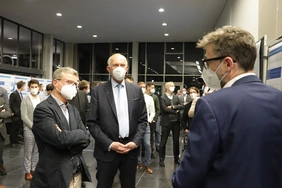Almost exactly one year ago, the "AImotion Bavaria" institute was founded at Technische Hochschule Ingolstadt (THI). It bundles the activities around the AI mobility node that Minister President Markus Söder established at the THI as part of the High-Tech Agenda Bavaria. At a ceremony on Tuesday evening, the professors and scientific staff involved came together to look back and look forward to the future. Bavaria's Minister of State for Science, Bernd Sibler, did not miss the opportunity to attend the anniversary celebration. He said: "Artificial intelligence as a key technology of the future has the potential to fundamentally change our society. In Ingolstadt, we have the best conditions for advancing AI in the field of mobility." That is why Bavaria is investing heavily in the framework conditions for excellent AI research, "so that we can attract the brightest minds to the Free State".
Through the High-Tech Agenda Bavaria and the High-Tech Agenda Plus alone, around 3.5 billion euros are flowing into key technologies such as artificial intelligence. "Because the future of our state depends on our innovative strength. TH Ingolstadt is a strong university that demonstrates this innovative strength excellently," said Sibler. This is why the ideal location for the AI mobility node has been found here.
THI President Prof. Dr. Walter Schober thanked Minister Bernd Sibler for his strong support in this area. Last year, the THI was already able to fill 15 of the 20 professorial positions, and two are currently in the appointment process. The number of academic staff is expected to double from the current 35 to around 70 by the end of 2022. By 2025, THI wants to expand the AI node to 120 academic staff. "We are thus supporting the digital transformation of our region - and strengthening Bavaria as a science and business location," said Prof. Dr. Walter Schober.
In order to illustrate the research, the researchers around Institute Director Prof. Dr. Michael Botsch had prepared an extensive poster session in the THI auditorium. Exciting insights were provided on artificial intelligence in the fields of automated driving, autonomous driving and digital production. Jeremias Gerner, for example, was happy to explain to the interested guests his research on sustainable urban development, in the context of which he is working on intelligent traffic light control in Ingolstadt. For Dr Sebastian Krügel, for example, the focus is on the ethics and acceptance of AI. He is researching what is important to people in autonomous driving vehicles, what moral values they ascribe to a car. The research topics are diverse and point the way to an exciting future.
The anniversary event is part of the Science Week for Artificial Intelligence. The first International AI@motion Network Conference also took place during this week. Researchers and companies with a focus on artificial intelligence and mobility meet at the THI and internationally in a hybrid format with the aim of building a regional and international network on artificial intelligence.


![[Translate to English:] Logo Akkreditierungsrat: Systemakkreditiert](/fileadmin/_processed_/2/8/csm_AR-Siegel_Systemakkreditierung_bc4ea3377d.webp)








![[Translate to English:] Logo IHK Ausbildungsbetrieb 2023](/fileadmin/_processed_/6/0/csm_IHK_Ausbildungsbetrieb_digital_2023_6850f47537.webp)


